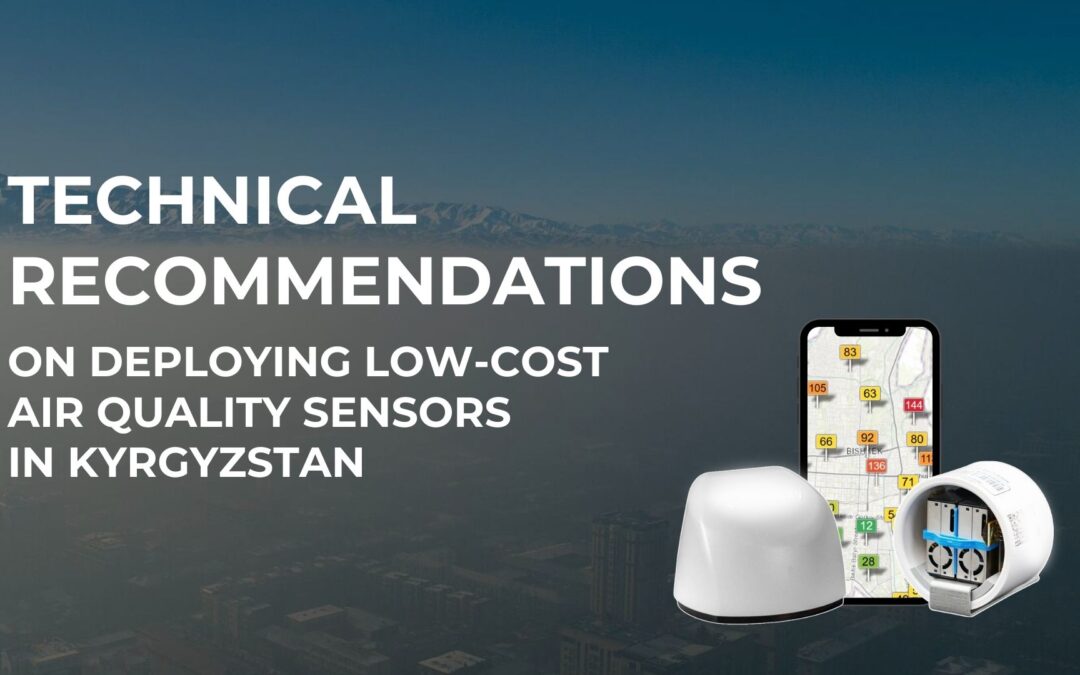Air quality monitoring is one of the key tasks for ensuring public health and environmental protection. In recent years, the Kyrgyz Republic has seen growing interest in environmental issues due to increased air pollution levels and their negative impact on public health. In this context, the implementation of air quality monitoring systems, including the use of low-cost sensors, is becoming particularly relevant. The World Meteorological Organization (WMO) has also recognized these sensors as an effective tool for air quality monitoring. According to a recent WMO report1, low-cost sensors or LCS “…can complement existing networks of certified reference sensors (stations) by expanding their spatial coverage and increasing monitoring density to obtain more localized data.” In accordance with best practices outlined in WMO measurement method reports, LCS should be co-located with these reference sensors to quantify their measurement uncertainties in the target environment. This will facilitate the proper application of LCS data for improving forecasting and reconstruction considering specific locations, more accurate quantification of local source impacts, identifying air quality differences, evaluating mitigation measure benefits, and promoting public engagement in air quality issues.
These recommendations are intended for activists, public organizations, and government agencies interested in implementing and using low-cost sensors for air quality monitoring in the Kyrgyz Republic. The document aims to create an effective monitoring system using modern technologies and ensure the integration of data from low-cost sensors into the national air quality monitoring system in accordance with the existing legal framework, including the Law of the Kyrgyz Republic “On Hydrometeorological Activities” and other regulatory legal acts.
The purpose of this document is to provide practical guidance on the selection, installation, and maintenance of low-cost sensors, as well as on ensuring the quality of data obtained from such sources and their integration into the national monitoring system. The document covers all key aspects of monitoring network deployment: from selecting pollutants to track to methods of integrating data with the national monitoring network, including the use of data for calculating the Air Quality Index (AQI).
Special attention in the document is paid to the legal aspects of installing and operating air quality sensors. The recommendations contain a detailed analysis of the regulatory legal acts of the Kyrgyz Republic governing air quality monitoring, including requirements for registration in the State Register of Hydrometeorological Information Producers, verification of measuring instruments, and rules for data collection and transmission, which will allow activists and organizations to ensure full compliance of their activities with legislative requirements and successful integration of the obtained data into the national air quality monitoring system.
This document examines approaches to integrating data from low-cost sensors into the national air quality monitoring system. It also includes recommendations for activists and government agencies on using this data for more effective air quality management in the country.
Recommendations is available here.
These technical recommendations were developed by the Public Association “MoveGreen” within the framework of the project “Nature-based Solutions for Enhancing Resilience to COVID-19 and Urban Air Pollution in the Western Balkans and Central Asia,” implemented by the United Nations Environment Programme (UNEP) and the United Nations Human Settlements Programme (UN-Habitat) in 2022-2025, funded by the UN Development Account.
Author of the technical part of the recommendations: specifications, requirements for installation, calibration and maintenance of low-cost sensors – Begaim Alipova, air quality monitoring expert. Author of the section on the regulatory and legal aspects of the implementation and operation of low-cost sensors – Jamal Kadoeva, expert in environmental legislation.




